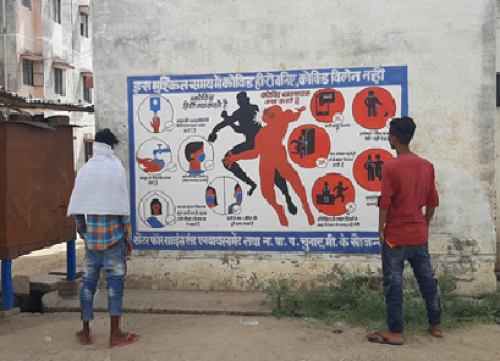

How awareness drives involving local bodies, distribution of PPEs and other equipment, helped turn the COVID-19 situation around


-chunnar_fort.jpg)
The novel coronavirus disease (COVID-19) has taken the world by a storm and has caught the civic bodies, particularly in small towns, off guard. While the Union government revises guidelines to suit the situation, there is a caveat: By the time they reach the last mile, new rules are laid down. To top it all, local bodies are expected to arrange their own funds to comply with the guidelines in most cases.
In such a scenario, combating COVID-19 has proven to be a challenge in small towns. One such town is Chunar in Uttar Pradesh’s Mirzapur district.
Is social distancing possible?
Social distancing is one of the major strategies suggested by the World Health Organization (WHO) and endorsed by the Union government. But can the urban poor really follow it?
This question is even more important for smaller towns, where there is hardly any enforcement or attention of media.
Most people in small towns are dependent on local businesses or are daily wagers — both of whom were hit hard by the series of lockdowns. They were eager to get back to work, and they did. Now that it is business as usual in most states, social distancing has nearly gone for a toss.
Does everyone have a smart phone?
Everybody in our country does not have a mobile phone, forget a smart phone. It is estimated that in India, around 32 per cent mobile phone users have a smart phone. This means even if all these people have access to consistent internet connection — and if all of them install Arogya Setu app — the others are simply on their own.
Also, not everybody who has a smart phone knows how to use it.
Sanitation and healthcare facilities
Taking necessary precautions is a small town’s best bet. The most vulnerable to the virus are healthcare and sanitary workers, who, day in and day out, try to maintain health and hygiene. They often struggle to get hold of personal protective equipment.
Here is how Chunar is battling similar issues.
What can a small town do?
The Nagar Palika Parishad Chunar (NPPC), the urban local body of Chunar, realised that apart from general fumigation, relief work for migrants and urban poor, they would have to think out of the box to make sure the general public is aware of the gravity of the situation.
As suggested in National Urban Sanitation Policy and Advisory on Onsite and Offsite Sewage Management, Government of India, Chunar constituted a city sanitation task force (CSTF) comprising members of different background. The task force meets once in three months to discuss and solve issues pertaining to sanitation in the city.
The stakeholder group, led by chairman and executive officer of the city, has representatives from urban local body, academics, healthcare, media, jal nigam (water authority), non-profits along with few ward members of the city. It meets virtually to discuss the way forward.
The group also unanimously decided to implement an awareness drive along with making arrangements for personal protective equipment (PPE) and training for sanitary workers.
Awareness drive for general public
In collaboration with Centre for Science and Environment (CSE), a New-Delhi based global think tank, NPPC organised a COVID-19 awareness campaign in the city. Children of the city were roped in, for it was believed that if one kid draws his feelings, the whole house will get sensitised. Several activities were tried out, listed as follows:

Wall paintings to combat COVID-19

Every morning audio messages on Covid-19 awareness are played on vehicles like these
Safety of sanitary workers
In order to flatten the curve, Chunar realised it was crucial to protect its frontline sanitation workers. To provide PPE kits and other relevant equipment to them, the NPCC and CSE raised CSR money. Following activities were carried out to ensure safety of sanitary workers:

Fumigation work in containment zone wearing PPE kits

Sanitary workforce getting trained in taking precautions
Collective efforts including active stakeholder engagement and sensitising sanitation workforce helped Chunar develop an effective response to COVID-19. There are less than 10 COVID-19 cases in area, but the local body does not plan to get complacent.
CSE Technical Support Unit is closely working with Nagar Palika Parishad Chunar to achieve city wide sanitation by mainstreaming faecal sludge and septage management. For more details click here.
We are a voice to you; you have been a support to us. Together we build journalism that is independent, credible and fearless. You can further help us by making a donation. This will mean a lot for our ability to bring you news, perspectives and analysis from the ground so that we can make change together.

Comments are moderated and will be published only after the site moderator’s approval. Please use a genuine email ID and provide your name. Selected comments may also be used in the ‘Letters’ section of the Down To Earth print edition.